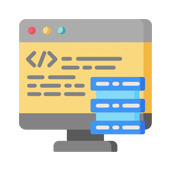All resources in Creative Coding
CS in SF CS Discoveries
(View Complete Item Description)CS Discoveries is an introductory computer science course that empowers students to create authentic artifacts and engage with computer science as a medium for creativity, communication, problem solving, and fun.
Material Type: Full Course
SFUSD MyCS
(View Complete Item Description)MyCS is a middle years computer science curriculum, created by the San Francisco Unified School District (SFUSD) in 2017, and based on a curriculum originally created by Harvey Mudd College. The lessons highlight the personal relevance of computer science to middle school students and attempt to present CS as a fun, creative, and collaborative discipline. The curriculum was designed to be implemented as a discrete introductory computer science curriculum, taught every day for variable lengths.
Material Type: Full Course
UVU PREP CS Curriculum
(View Complete Item Description)This curriculum was to build a 7-week CS curriculum for the Utah Valley University Pre-freshman Engineering Program (UVU PREP) for the summer of 2018 that encompasses more emerging technologies, high-demand programming languages, and student-centered pedagogy to help develop students' interest in CS. The implementation and evaluation of the lessons that were created suggest that a more inquiry-based approach with the support of robotic hardware could be an effective way to increase student interest in CS and help alleviate workforce shortages and invite more diversity to the field.
Material Type: Full Course
Code Club Projects
(View Complete Item Description)Code Club is a global network of free coding clubs for 9- to 13-year-olds. Welcome! Here you’ll find step-by-step instructions for our coding projects, which will teach you how to create games, animations and more with code.
Material Type: Activity/Lab
Code.org Express Course (Student)
(View Complete Item Description)Learn the basics of computer science and internet safety. At the end of the course, create your very own game or story you can share. CS Fundamentals Express combines the best of Courses A-F into a single condensed course (with a simpler option for pre-readers). We recommend Courses A-F for most classrooms, but if your school only offers one computer science course or you want to have your students work through multiple courses in a single year, the Express course is a better choice. By removing the ramp up between years, the express course provides a smoother path and doesn’t repeat concepts for students unnecessarily. This is also our recommended option for students studying computer science on their own, outside of a classroom.
Material Type: Full Course
Computer Science Discoveries
(View Complete Item Description)Computer Science Discoveries is appropriate for 6 - 10th grade students and can be taught as a semester or year long introductory course (3-5 hours per week of instruction for 9+ weeks). The course takes a wide lens on computer science by covering topics such as programming, physical computing, HTML/CSS, and data. The course inspires students as they build their own websites, apps, games, and physical computing devices.
Material Type: Full Course
Google CS First
(View Complete Item Description)The activities below introduce students to computer science and the programming language Scratch. Different themes attract and engage students of varying backgrounds and interests. All materials are free and easy to use.
Material Type: Activity/Lab, Module
Hour of Code
(View Complete Item Description)The goal of Code.org is to bring computer science to every K-12 school in the United States, especially in urban and rural neighborhoods. They provide free workshops, lessons, and videos to help educators to students the basics of coding.
Material Type: Activity/Lab, Interactive
Made with Code
(View Complete Item Description)Check out some of the amazing things you can do with code.
Material Type: Activity/Lab
Scratch 3.0 Creative Computing Curriculum Guide
(View Complete Item Description)This guide is a collection of ideas, strategies, and activities for an introductory creative computing experience using the Scratch programming language. The activities are designed to support familiarity and increasing fluency with computational creativity and computational thinking. In particular, the activities encourage exploration of key computational thinking concepts (sequence, loops, parallelism, events, conditionals, operators, data) and key computational thinking practices (experimenting and iterating, testing and debugging, reusing and remixing, abstracting and modularizing). Learn more about computational thinking – what it is and how to assess its development in learners – from resources in the appendix or by visiting http://scratched.gse.harvard.edu/ct
Material Type: Full Course












